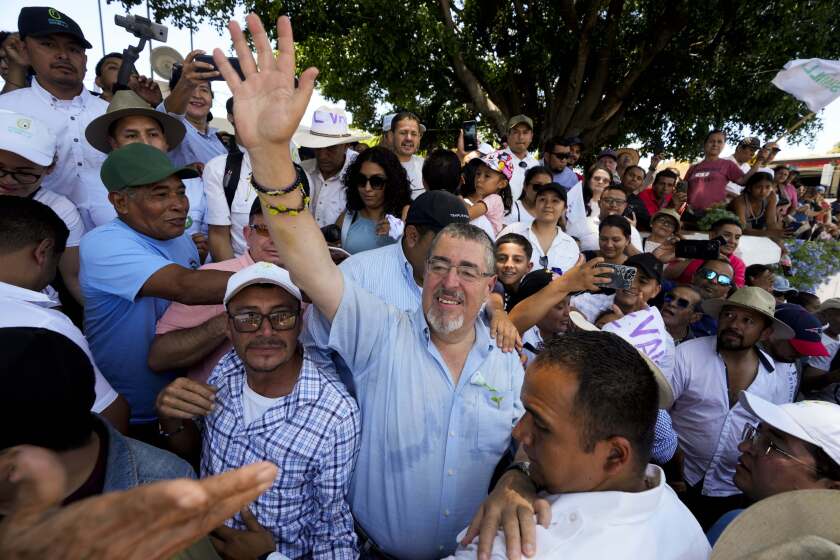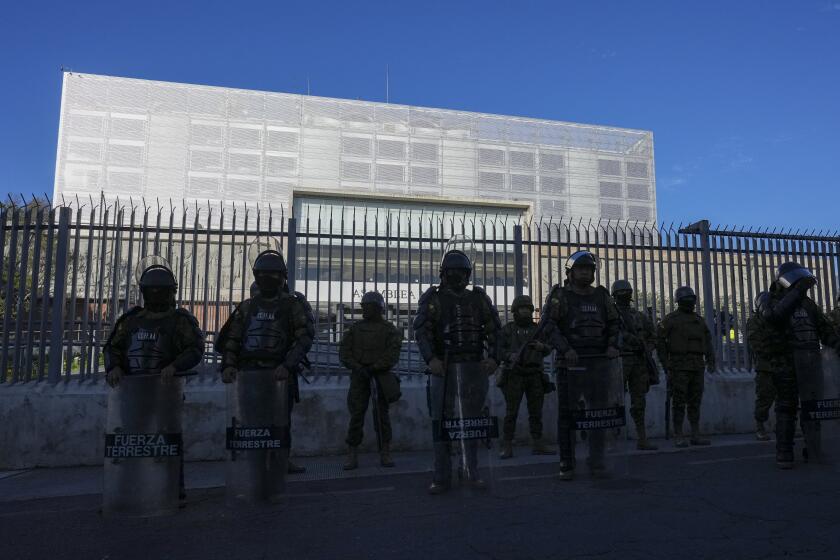Opinion: Organized crime threatens Latin America’s democracies and fuels migration. The U.S. can help

- Share via
Peru’s last dictator, Alberto Fujimori, has pulled off a jailbreak years in the making — not by tunneling his way out of prison but by the graces of the country’s highest court. His early release in December is part of a broader problem in Latin America, where the line between governments and crime keeps getting blurrier.
The 85-year-old Fujimori was a little more than halfway through a 25-year sentence for greenlighting extrajudicial killings and kidnappings and embezzling $15 million during his decade-long rule, which ended in 2000. But Peru’s Constitutional Court was apparently unbothered by his unpaid debt to society. The court brought about his release by reinstating a years-old presidential pardon.
That blatantly violated international law: The Inter-American Court of Human Rights forbade Peru from shortening Fujimori’s sentence. But as the country’s democracy slid into chaos over the last year, Fujimori’s still powerful family worked to get sympathetic judges on the bench.
Bernardo Arévalo won election on a pro-reform agenda. He wants to tackle ills that drive many to the U.S.-Mexico border.
The resulting release of Fujimori, who ran Peru as a mafia state, comes as the country’s politicians are chipping away at the capacity to investigate corruption and organized crime. Peru isn’t alone. In several countries across the region, politicians appear determined to weaken the state’s ability to counter criminal groups.
In Guatemala, dozens of lawmakers sanctioned by the United States for corruption have fought to block President-elect Bernardo Arévalo, an anti-corruption crusader, from taking office. In Ecuador, violent gangs are on their way to taking over, having recruited dozens of public officials to do their bidding, according to the country’s top prosecutor. In Mexico and Brazil, drug cartels and paramilitaries loom large over some state and local governments.
Latin America’s democracies and democrats don’t get enough credit for weathering inequality, violence and economic stagnation. Miraculously, only two of the region’s former democracies, Venezuela and Nicaragua, have collapsed into full-fledged authoritarianism. In no other part of the world have so many democracies held up under such pressures for so long.
The president disbanded the National Assembly to avoid impeachment. The move bodes ill for the country’s democracy and could return Rafael Correa to power.
They have even pulled off remarkable but often overlooked successes, nearly halving the share of Latin Americans living in poverty since 2000, taming inflation, ending a long tradition of military coups and civil wars, and putting leaders such as Fujimori in jail.
But the increasing power of organized crime stands out as a threat they haven’t countered effectively. For the last 40 years — about as long as Latin America’s democracies have been around — the region’s illicit economies have experienced a practically uninterrupted boom. Chief among them, the global cocaine trade spawned some of the world’s most sophisticated transnational criminal organizations. Such groups have inserted themselves into the above-ground economy by laundering their vast wealth and have branched out into other illegal activities: extortion; mining, logging and fishing in protected areas; and, increasingly, human smuggling.
Organized crime can’t grow without state protection, and Latin American mafias have long made it a mission to capture parts of the state. They have had at least as much success amassing political power as any of the region’s political parties. Lawmakers, police forces, courts, mayors, port authorities, air traffic control and even presidents have been bought off or coerced to ensure that trafficked drugs, resources and people flow freely to their destinations — often, in the United States.
Now much of Latin America lives under a hybrid form of government in which both democratic states and organized criminal groups exercise power — sometimes in competition and sometimes together. It’s often immensely difficult to tell who is really in control. “There aren’t just three branches of government here,” a lawyer in Mexico City recently told me. “There’s a fourth: organized crime.”
Until the last decade, criminal groups mainly threatened to capture state institutions in countries that were either major drug producers — such as Colombia and Peru — or unlucky enough to be situated along major trafficking routes: Venezuela, Mexico and northern Central America. But that’s changing as ambitious criminal groups establish footholds in new countries and markets.
Once-peaceful Ecuador has become a haven for violent gangs specializing in extortion, driving one of Latin America’s largest recent waves of emigration. Costa Rica, a strong democracy known for its safety, is grappling with an alarming surge in killings. Ports in Chile and Uruguay are gaining new importance in the cocaine trade.
When mafias and states merge, corruption and violence can reach such extremes that people will settle for any alternative, even an authoritarian one. The idea of the tough-on-crime strongman has caught on again despite its demonstrated shortcomings.
Fujimori, for example, dispensed with democracy to crush a brutal drug-trafficking insurgency that had terrorized Peruvians for years. But as independent institutions and oversight fell away, top state officials didn’t eliminate crime; they just took over the business. It wasn’t until more than a quarter-million Peruvians took to the streets that they were able to oust Fujimori and end his inner circle’s crime spree.
Latin America’s independent prosecutors, judges and police have shown a better way to tackle crime. In Colombia, Guatemala and post-Fujimori Peru, they convicted dozens of public officials of abetting organized crime, weakening mafias by depriving them of state protection. Ecuador’s attorney general is making a similar push now.
The results stick only when prosecutions are backed up by anti-corruption reforms, which often prove politically difficult. U.S. support can help.
Congress has dedicated relatively little spending to bolstering the rule of law in Latin America, especially considering that Americans’ voracious drug demand pays a good portion of the salaries of the region’s crime bosses. Meanwhile, U.S.-made firearms flow too easily over our borders, arming Latin America’s gangs and cartels.
Washington can’t manage the unprecedented hemispheric surge in migration without Latin American governments’ help. But securing their cooperation must not mean turning a blind eye to emerging mafia states or abandoning reformers.
Fujimori appeared to be swimming against the tide of history in the 1990s, when every other Latin American country besides Cuba had become a democracy. In retrospect, he looks more like a harbinger of challenges to come. But Peru eventually turned a corner; perhaps Latin America can too.
Will Freeman is a fellow for Latin America studies at the Council on Foreign Relations.
More to Read
A cure for the common opinion
Get thought-provoking perspectives with our weekly newsletter.
You may occasionally receive promotional content from the Los Angeles Times.












